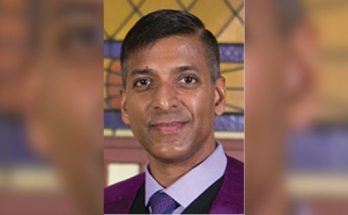By Carola Rico
Vladimir Putin’s invasion of Ukraine has turned the world upside down. Cities have been destroyed; hospitals, theaters, schools, and shelters have been bombed; civilians and children have been killed. As frightened and exhausted Ukrainians seek refuge from the invaders, more than 10 million people have fled the country so far.
To understand the historical importance of the invasion, we couldn’t find a better or more knowledgeable analyst than Richard Lourie, writer, critic, and expert on Russian politics. Lourie, who first visited San Miguel in 1992 and has lived here since 2007, recently gave and a lecture at the Biblioteca about the conflict, with insights into the psychology of Vladimir Putin.
His interest in Russia dates to an early age; his father was originally from Russia but moved to the U.S. at the age of nine. As a young child, Lourie remembers asking his father what Russia was like. His father always answered that it was terrible and would not elaborate, which increased Lourie’s curiosity about the country. He wondered, “Terrible? What does terrible mean, and what about the country is terrible?” Lourie noted that in contrast to his father, his grandfather loved everything about Russia: vodka, wolves, snow…
Later in his life, as he studied in California for a doctorate in in Russian Studies, Lourie wrote and translated more than a dozen books whose main subject was Russia. This required numerous visits to that country, where he spent time as a resident. Lourie relates that he typically lived in communal apartments, where five or more families might live in a space with only one bathroom and one kitchen.
He explained that this was also how Putin lived as a youth. Born into a Soviet family on October 7, 1952, in Leningrad, (now Saint Petersburg, Russian Federation), Putin lived in a communal apartment that, based on what Lourie observed, was probably not very pleasant. He explained that communal houses have stratified social classes and that Putin was of very humble origins.
This year, the president of Russia will turn 70, and Lourie views Putin’s advanced age as a key psychological factor underlying his invasion of Ukraine. He believes that Putin is driven to make his mark on Russian history. He said that during Putin’s 20 years in government, although some stability and progress have been made, Putin hasn’t made great achievements and may perceive the invasion of Ukraine as his last chance to do something that will go down in history as a key accomplishment of his political life.
Lourie said that Putin is afraid of getting COVID-19, which makes it difficult to talk and get close to him. To access Putin, people must spend a minimum of seven days in quarantine, and after an hour with him, they must return to quarantine for seven more days. This makes negotiating and working with the Russian leader difficult, he said, noting that Putin’s system is one based on fear and not on effectiveness.
One of the books Lourie wrote five years ago is called “Putin and the Fall of Russia.” When he wrote this book, the situation in Russia was very different. The price of a barrel of oil was approximately US$150—the highest price achieved in the country’s history. At that time, there was great wealth and a good opportunity for Putin to use some of it to transform the country from an oil-based economy to one based on technological innovation. However, Putin did not make this transition—perhaps because of conservatism, or perhaps he feared risking what already existed.
Lourie commented that Putin’s latest attempt to make his mark on history by conquering Ukraine will also be a failure because he will not be victorious. Lourie described the obedience of Putin’s advisers and ministers as superficial, saying they don’t really support this war 100 percent and are simply waiting for it to end in defeat, for the death of Putin, or for the situation to return to the way it was. “Putin, in my opinion, is a victim of his own psychology, and my prediction is that he is probably going to lose his job soon—before his birthday, which is in October,” Lourie said. “He will be imprisoned and will be without a job.”
Lourie is confident that a group of people are already preparing a conspiracy against Putin. He said it may be a very slow and complicated process, requiring time to assemble all the pieces, and will be a diplomatic solution, perhaps involving the Chinese, along with NATO and the European Union. The most important thing, he said, is what happens between Ukraine and Russia, Putin’s group of personal advisers, and Russia’s Wagner Group—also called Putin’s private army—which includes some 600,000 mercenaries and is almost as large as the Russian army. The leader of this battalion declared a few days ago that not everything is perfect, which can be taken as a sign that those around Putin have doubts about the decisions he is making.
Lourie has personal ties to the current conflict, including a nephew who is a war photographer currently in Kyiv, along with friends that he has been unable to contact to check on their safety.
Following Lourie’s lecture at the library, he stressed that one of the main global concerns surrounding the battle for the Ukraine is the threat of a nuclear confrontation between the United States and Russia—a situation that would impact the entire world.




